Regarding the situation in Venezuela
A democratic and peaceful resolution needs to be achieved and the full enjoyment of human rights guaranteed. Interventionist moves by the United States must be rejected by the international community.

A democratic and peaceful resolution needs to be achieved and the full enjoyment of human rights guaranteed. Interventionist moves by the United States must be rejected by the international community.
First impressions on the draft optional protocol to the legally binding instrument on business and human rights, by Gabriela Kletzel and Andrés López Cabello from CELS and Daniel Cerqueira from the Due Process of Law Foundation (DPLF).
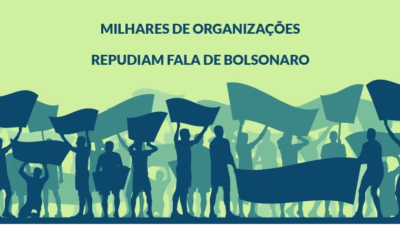
Nearly 3,000 national and international NGOs, collectives and social movements rejected presidential candidate Jair Bolsonaro’s remark indicating that, if elected, he would “end all activism in Brazil.” We explain the reasons why this represents a threat to democracy in the following statement of repudiation.
US National Security Adviser John Bolton made explicit and concrete threats against ICC judges, prosecutors and personnel if they proceed with an investigation into alleged war crimes committed by US forces in Afghanistan. A group of national and international organizations requested that the UN Assistant Secretary-General for Human Rights take urgent action in response. Our joint letter to him follows.
A novel intervention by international experts in Mexico invigorated the work of human rights organizations to fight against systemic impunity in the country, according to Gabriela Kletzel and Angel Gabriel Cabrera Silva.
The US ambassador to the UN said that her country’s decision to abandon the Human Rights Council was partly due to the opposition of 18 organizations to the Council reform proposal backed by Washington. CELS, one of these organizations, responded to her.
The Working Group on discrimination against women urged the Argentine state to approve the bill to legalize the voluntary interruption of pregnancy. This is the latest in a series of such recommendations by UN bodies, based on human rights considerations.
INCLO is a network of 13 national human rights organizations from different countries that work together to promote fundamental rights and freedoms. After celebrating a victory in Ireland on the abortion referendum, it is now Argentina’s turn.
“Enough is Enough”: 95 civil society organizations call on the UN Human Rights Council to urgently launch a Commission of Inquiry to investigate violence against protesters in Palestine.
More than half a million women undergo clandestine abortions every year in Argentina and since 1983, more than 3,000 women have paid for the criminalization of abortion with their lives.
The UN Special Rapporteur on torture, upon concluding his visit to the country, said that detention conditions in provincial police stations and prisons “severely contravene international standards and are incompatible with human dignity.” He also denounced the “degrading” conditions in the Melchor Romero psychiatric hospital and police violence in low-income neighborhoods. At the same time, he urged the Argentine state to allocate “sufficient resources to ensure the timely processing and adjudication of the remaining cases and trials for crimes against humanity.”
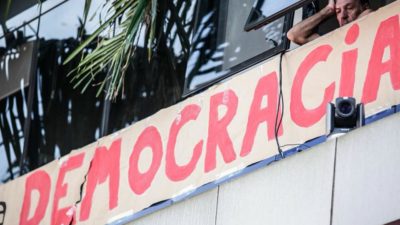
Joint statement by more than 60 organizations in the Americas regarding the situation in Brazil and its consequences for human rights.
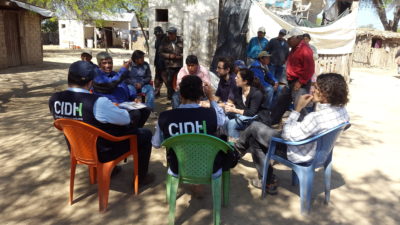
An emblematic case for guaranteeing the rights of indigenous peoples in our country has been brought before the Inter-American Court of Human Rights.
FIDH, CELS and Abuelas de Plaza de Mayo present an amicus curiae brief before the Inter-American Court of Human Rights, demonstrating the incompatibility of the pardon granted to former Peruvian President Alberto Fujimori with international and inter-American human rights standards.
The UN Committee on Enforced Disappearances closed its urgent action that had requested the Argentine government to search for and find Santiago Maldonado, while reminding the state of its obligation to guarantee an exhaustive, impartial and independent investigation.
In a joint statement by 11 organizations, we call attention to the dangers of approving a law that allows for militarizing domestic security in Mexico, due to the impact it would have on human rights in that country and the negative precedent it would set in Latin America.
In a joint statement by human rights organizations from the Americas, we reject the proposal that the United States block oil imports from Venezuela – a proposal Argentina’s president has backed.
Next week the Inter-American Commission on Human Rights (IACHR) will hold its 165th session in Montevideo. CELS will participate with other organizations in two public hearings and two work meetings with representatives of the IACHR and the Argentine state.
National organizations presented their assessments for the Universal Periodic Review (UPR), a peer evaluation of the human rights situation in each of the UN’s 193 member states. Argentina will be evaluated in early November.
At a hearing before the Inter-American Court of Human Rights on the Fontevecchia case, the Argentine state used the argument of separation of powers to try to justify not complying with its international obligations.

The UN Committee determined that the disappearance of Santiago Maldonado requires “urgent action by the state party to search for and locate him” and to identify those responsible.
The Venezuelan government did not protect the right to life and restricted the rights to freedom of expression, of assembly and of political participation. The United States government imposed new legal and financial sanctions on the country. The situation requires the international community’s active commitment to support Venezuela in finding a sovereign way out of the crisis.
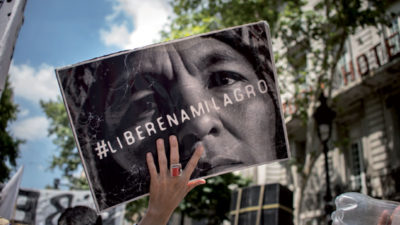
The Inter-American Commission on Human Rights (IACHR) granted the precautionary measure in favor of Argentine social leader Milagro Sala, making it clear that she cannot remain in prison any longer. Sala has been arbitrarily detained since January 16, 2016, when she was arrested over a protest. The precautionary measure was requested by Amnesty International, Andhes and CELS.
The Global Compact on migration could be an unprecedented intergovernmental tool but the majority of states have expressed an interest in intensifying the current model, centered on controls and security, instead of transforming it.
In the midst of a wave of unpunished violence against journalists and human rights defenders, it has come to light that the Mexican government is running surveillance and spying on members of the press, activists and political parties. Human rights organizations are calling for an investigation of these acts by a panel of independent experts.
Published by openDemocracy, this opinion piece analyzes the joint work and individual strategies that different Argentine, regional and international organizations used to convince OAS member states to reject Argentina’s candidate to the IACHR, Carlos Horacio de Casas.
“Regulating migration” must stop being equated with impeding or criminalizing migrants. In regional and international forums, we promote alternative models that guarantee their rights.
The countries of the OAS must elect new commissioners to the IACHR. In February we formally objected to the Argentine state’s candidate. In addition, two ex-presidents of the IACHR, an international panel of independent experts and more than 60 scholars rejected his candidacy.
Last year the Inter-American Commission on Human Rights (IACHR) suffered the worst financial crisis in its history, despite the fact that the Inter-American Human Rights System has served as a blueprint for the development of other regional mechanisms.
The Decree of Necessity and Urgency (DNU) on migrants associates migration with crime, basing its assessment on partial, decontextualized data. This promotes xenophobia and stigmatizes migrants.
The Argentine state was called to appear before the IACHR to give its response regarding the repression and criminalization of social protest in Jujuy. In that province criminal, misdemeanor and administrative proceedings are used to limit the right to protest, freedom of expression and freedom of association.
The career of Carlos Horacio de Casas, candidate for membership on the IACHR, has no ties to the defense or promotion of human rights, but rather to corporate, economic criminal and tax law. We contest his candidacy.
Joint press release by CELS, Amnistía Internacional and ANDHES.
Organizations from 27 countries sent a statement of support for the Committee on Enforced Disappearances and urged that its mandate be renewed.
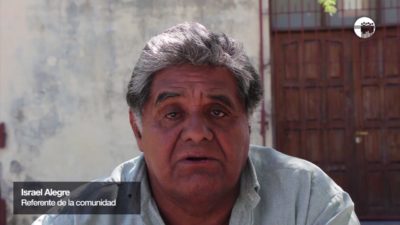
A hearing will be held before the Inter-American Commission on Human Rights (IACHR) regarding violence against the Nam Qom community in August 2002 and the lack of state response.
The UN Committee on the Elimination of Discrimination against Women released its concluding observations regarding Argentina.

Carlos Beristain and Claudia Paz y Paz, members of the Interdisciplinary Group of Independent Experts (GIEI) that investigated the disappearance of the 43 students from Ayotzinapa, visited Argentina.
The United Nations intergovernmental working group in charge of designing the treaty met in Geneva.
Joint press release by Amnistía Internacional Argentina, CELS and ANDHES.
On August 24, 2016, the Colombian government and the Revolutionary Armed Forces of Colombia–People’s Army (FARC–EP) signed the “Final agreement for the termination of the conflict and the construction of a stable and lasting peace.”
High-level plenary meeting on addressing large movements of refugees and migrants. United Nations General Assembly.
Dialogue between the UN Human Rights Committee and the Argentine state regarding compliance with the International Covenant on Civil and Political Rights.
Mexico’s human rights crisis and what occurred in Ayotzinapa were presented at the UN Human Rights Council.
Argentine social activist Milagro Sala stands accused of inciting the crime of obstructing traffic in relation to a protest she helped organize, and of sedition for resisting a provincial measure related to the work of cooperatives in which she participates.
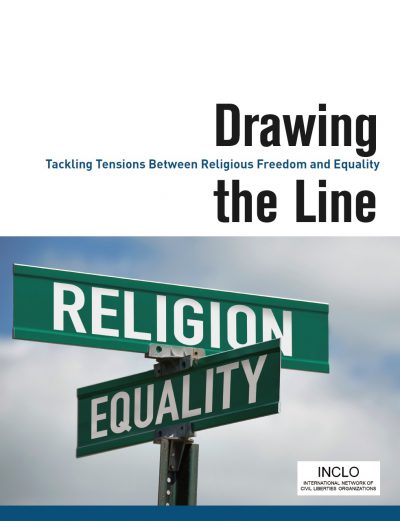
This report by the International Network of Civil Liberties Organizations (INCLO) focuses on three specific areas that are the subject of litigation, public debate and policy discourse: religious freedom and the rights of LGBT individuals; religious freedom and reproductive rights; and religious freedom as expressed in appearance.
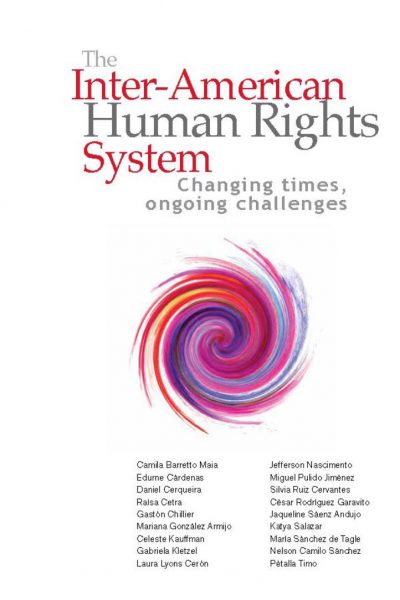
This book is the result of the experience gained by a group of human rights organizations that have extensive in-depth familiarity with problems on the ground and came together in an informal alliance in light of the need to develop new strategies to accompany the so-called “strengthening process” of the Inter-American Commission on Human Rights (IACHR).